
The Greatest Love Story Ever Told
JESUS PREACHES THE GOSPEL

The Greatest Love Story Ever Told
JESUS PREACHES THE GOSPEL
The Lord’s Sermon on the Mount was finished. His lesson for the day was now over. So Jesus and His disciples came down from the mountain side, and went into the city of Capernaum. Jesus had made His home there. As they entered the city they were met by some of the rulers of the Children of Israel, and they had a message for Jesus. There was a Roman captain, called a centurion, who had a much loved servant. This servant was very sick with the palsy. The centurion had heard of Jesus. He believed that the Christ could heal any sickness. So the centurion had sent word by these men, begging the Savior to come and heal the servant.
The rulers of the Children of Israel were glad to do something to help the centurion, because, although he was a Roman, he had been very kind to them. He had built them a synagogue. So they urged Jesus to go. The Christ said, “I will go and heal him.”
Jesus started off at once.
When He was not far from the house, Jesus was met by other friends of the Roman captain. They had another message for Jesus. It seems that the Roman captain had thought about it and felt that perhaps he had asked too much of a favor of Jesus. And so he sent the Lord this message, “Lord, trouble not yourself to come, for I am not worthy to have you come into my house. Speak the word where you are, and my servant will be well. For you can command disease to go, and be obeyed, just as I tell my soldiers to go or come, and am obeyed.”
Jesus was surprised that this Roman soldier trusted Him so completely. The Savior said, “I have not seen such faith as this among the Jews.”
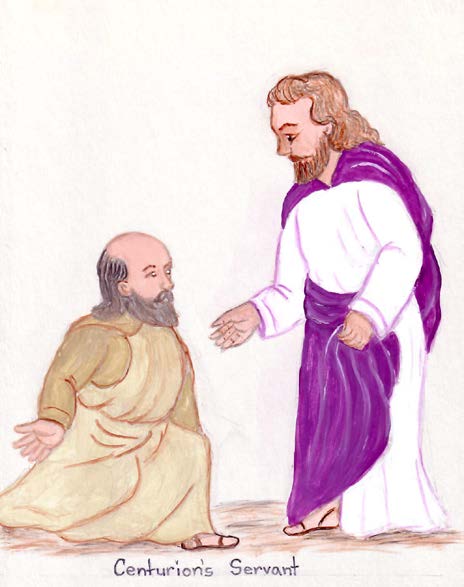
To the friends of the centurion Jesus said, “Go back to the house, for the servant is already well.”
The messengers went back and found the servant well, as Jesus had said.
Early the next morning, while it was cool, Jesus started out again in another direction. This time He went to Nain. Nain was a city about twenty-five miles from Capernaum. The disciples of Jesus went along. The crowds also followed.
When they reached the gate of the city they met a group of very sad people. A woman of Nain, whose husband had died some time before, had now lost her only son. Friends were carrying her son’s body outside the city for burial. The boy was loved very much, because a long procession followed him to the grave site. Lots of people were weeping because the boy had been taken away from them.
Jesus and His apostles joined the procession. Back then everyone who met such a sad procession was expected to join, out of respect for the sad family. This poor mother was very, very sad. When Jesus saw her sorrow and tears, He said to her, “Do not weep.”
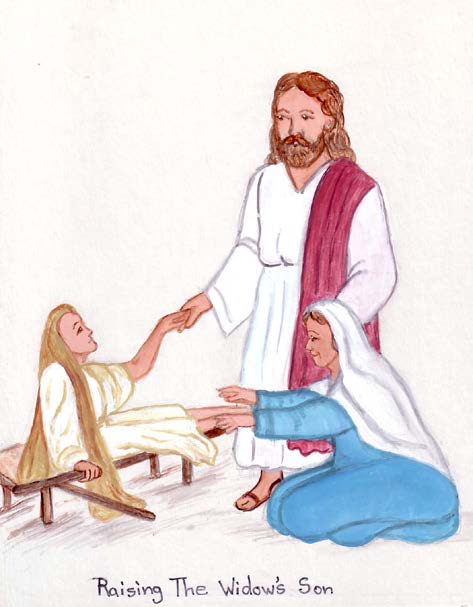
Jesus then did something that surprised everybody. He went up to the frame on which the young man was being carried, touched it, and told those who were carrying it to stop.
They did as Jesus said; wondering what was going to happen next. And what do you think happened next? Jesus said, “Young man, I say to you, Arise.”
The boy, even though he was dead, heard what the Lord said. He sat up and began to talk. Jesus gave him back to his mother. The Savior then left and went on His way.
The people who had seen what had happened were afraid and began to tremble. They had seen Jesus cure every kind of disease. But, now He brings a dead boy back to life. Only the Christ could do such a thing. They thanked God for such a Savior, and said, “A great prophet has come among us. Surely God has visited his people.”
The story of what Jesus had done spread about throughout Judea until some of the disciples of John the Baptist heard it. John was still in prison. His friends were allowed to visit him in prison. Some of them told John what they had heard about the great preacher, Jesus. John sent his friends to Jesus with this question “Are you the Christ that was to come, or must we still look for another?”
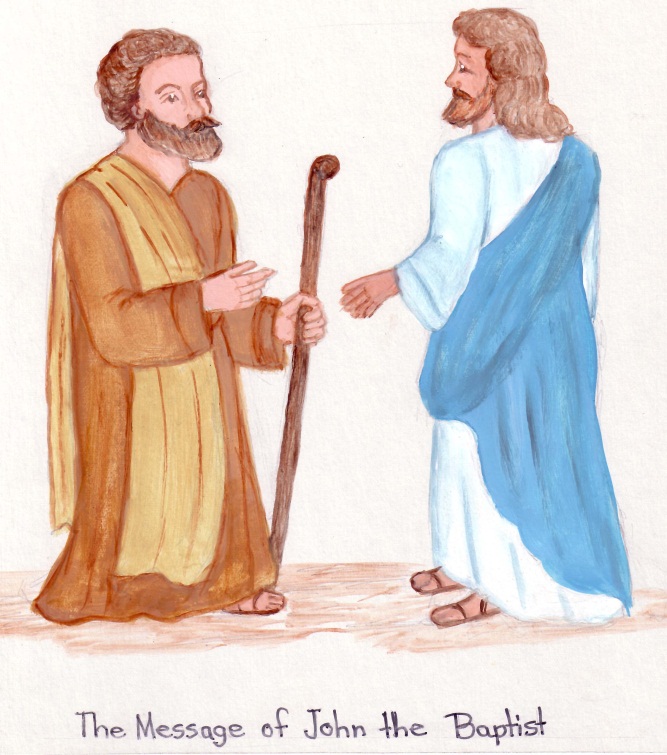
Instead of answering John’s friends in words, Jesus showed them the kind of work He was doing. There were lame and blind and sick people all around Jesus whom He cured and taught. Then Jesus said to John’s friends, “Go back and tell your master what you have seen and heard: how the blind see, the lame walk, the lepers are made well, the deaf hear, the dead are raised to life. And tell him, too, that the gospel is being preached to the poor.”
Gospel means “good news.” John the Baptist had preached the Gospel as long as he was allowed to. Jesus was doing it now. Jesus was doing as the prophets had said the Christ would do.
After John’s friends had left, Jesus spoke to the people in words of the highest praise of John the Baptist. Jesus said that John was the greatest prophet the world had ever seen. In the crowd, listening to Jesus, were some people who were fond of John, and were very glad to hear Jesus speak so well of him. But also in the crowd were some scribes and Pharisees. Many of them did not like John and thought of him as the rough preacher from the wilderness. In fact, some of them were angry when Jesus called John the greatest prophet.
Jesus told those scribes and Pharisees who were angry that their actions were like those of little children who would not be pleased with anything. Those scribes and Pharisees found fault with John. They said that he was not in his right mind. Why did some of them say this? – Because John the Baptist lived in a different way and wore different clothes; because he would not go into their homes and would not live among them. But they treated Jesus, the Son of God, the same way. Even though when Jesus, the Son of God, came among them He did live the way they did. Even though when Jesus, the Son of God, came among them He also went into their homes and ate with them. Still, many of the scribes and Pharisees did not think that Jesus was right either. It seemed that Jesus, like John the Baptist, could do nothing to please many of the scribes and Pharisees.
That very day Jesus was invited to take dinner with one of the Pharisees who could not quite make up his mind. This Pharisee was called Simon and he could not make up his mind whether this Rabbi or Teacher was, in fact, a prophet.
If a friend comes to visit us, or if we go to visit a friend, there are some things which we always do to be polite. This is true in every country. But, the rules of politeness are not always the same in every country. In Palestine they were very different from ours. As soon as the guest arrived at the house, he was expected to take off his shoes, or sandals, and leave them at the door. Sandals could be taken off very easily, because they were nothing but a sole with one or two straps over the foot and one over the ankle.
After the guest had taken off his shoes, the friend was received by the master of the house. The master of the house then gave the friend a kiss of welcome. He then led him to his place at the table. Then a servant brought water and bathed his feet, which was very refreshing to the one who had been traveling in that hot, dusty country. It was not hard for the servant to wash the guest’s feet, because they did not sit at the dinner table as we in America do. In Palestine, they lay on couches which were placed at three sides of the table. They rested on their left elbow and left their right hand free to use. Their heads were toward the table. Their feet were away from the table. In this way, the servant could easily pass from one person to another, bathing the tired feet. The Children of Israel were very fond of bathing. Do you remember the wedding at Cana of Galilee? Remember the six stone jars standing outside the door for the use of the guests? These jars were filled with water to be used in bathing.
After his feet had been washed, either the master of the house or the servant poured sweet-smelling oil on the head and beard of the guest. This was called “anointing him.” Then more water was brought for him to use in washing his hands. This was one of the things in which the Children of Israel were very particular. They always washed their hands before every meal. It is always good to wash our hands before a meal. But there was a special need for hands to be clean in Palestine. Everyone took his bread in his fingers and dipped it in a dish which was then passed to everyone else at the table.
Jesus accepted Simon’s invitation to dinner. Jesus wanted to be friendly with everyone and do what He could to please them. The Savior took off His sandals at the door. Then He went to His place at the table. Though he had invited the greatest man that ever lived to visit him, Simon did nothing to care for Jesus’ comfort. Jesus’ feet were not bathed. Jesus received no kiss of welcome, and no water was brought for His hands.
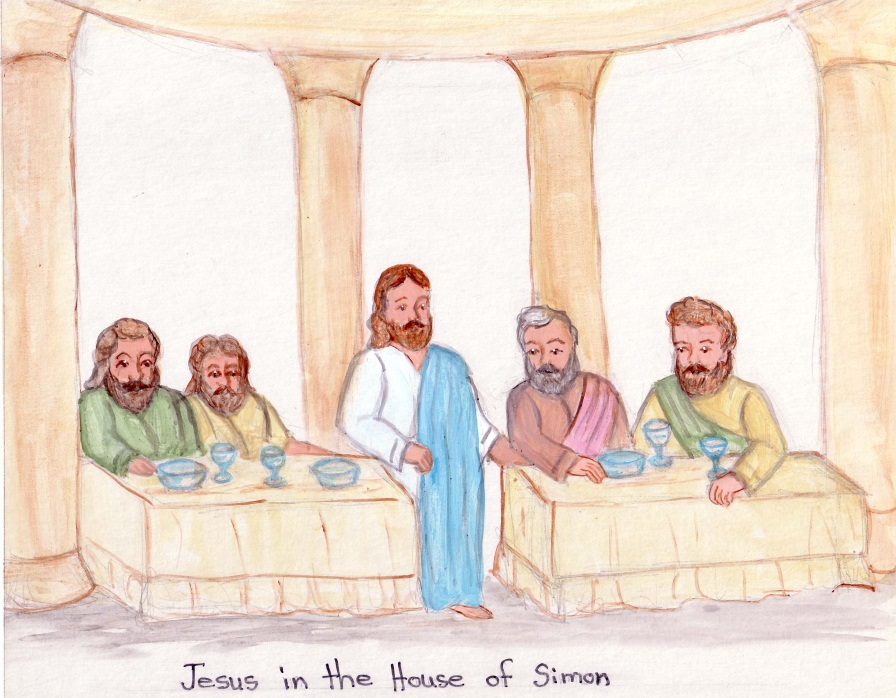
Jesus did not seem to notice that these things were not done. The Savior took His place at the table with the others, and said nothing. Things were going along as usual at dinner when something happened that Simon had not planned. The door was opened and a woman walked in. This woman was known in the town as a wicked woman. She carried in her hand a box of ointment, a sweet-smelling perfume which was very expensive.
It would not have seemed so strange if some man had walked into the house that way. Do you remember that in Palestine such a thing as that happened often? But to have a woman do so was very strange. Back then, it was commonly accepted that not even the women of the family were allowed at the table when the men were eating.
This woman did not mind the staring and angry eyes that were looking at her. She went straight to the feet of Jesus. She had heard the great Teacher some time before this moment. The teachings of Jesus had made her very ashamed of herself and she had been living a different kind of life since that time. When she heard that Jesus was at Simon’s house she made up her mind to go there, too. She wanted to show that she was thankful to the Savior for teaching her to be a better woman.
She did not feel worthy to be His friend, but she could do for Him the work of a servant. As she stood behind Him, crying, her tears fell so fast that Jesus’ feet were wet with them. She wiped her tears away from the Savior’s feet with her long hair. Even though she was crying, she was very happy to be so near her Savior. She showed her happiness and love by tenderly kissing Jesus’ feet. Then she took some of the sweet-smelling ointment from her box and rubbed His feet with it.
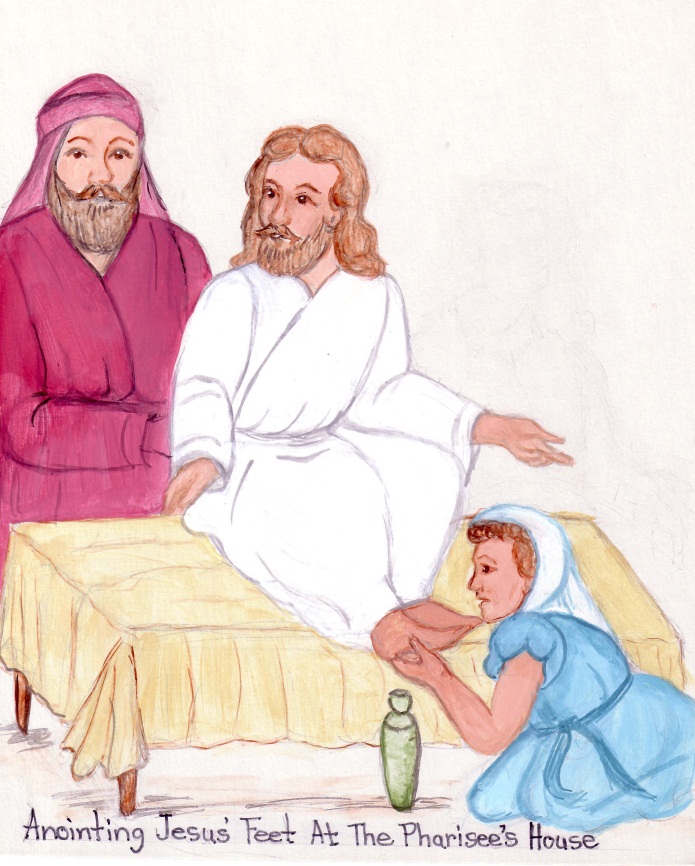
All this time Simon looked on, wondering why Jesus did not put a stop to what the woman was doing. Simon said to himself, “If this man were the prophet they say he is, he would know what kind of a woman this is, and would not allow her to touch him.”
The Savior was looking at Simon. He knew what Simon was thinking about. Jesus said, “Simon, I have something to say to you.”
Simon answered, “Master, say on.”
Then Jesus told him this story: Two men owed another man some money, but neither of them had anything with which to pay their debt. One of them owed a lot of money, but the other owed only a little. The man they owed knew that neither of the men could pay him. So, he forgave them both. In other words neither had to pay anything. Then Jesus asked, “Which do you suppose will love him the most?”
Simon answered, “The one who owed the most, I suppose.”
Jesus said, “You have answered right.”
It seemed as if Jesus had not noticed the woman before, but now Jesus turns to her and, still talking to Simon, says, “Do you see this woman? I came to your house because you invited me. You gave me no water for my feet, but she has washed my feet with tears and wiped them with her hair. You gave me no kiss, but this woman since I came in has not stopped kissing my feet. You did not anoint my head, but she has poured ointment on my feet. We all know that she has been a very wicked woman, but she will never be so again. She has done many wrong things, but they have all been forgiven, and she is so thankful that her heart is full of love.”
Simon saw what the Lord’s story meant. It meant that both he and the woman had done many wrong things, although the woman had been more wicked than Simon. Neither of them could pay God to forgive them. Yet, because God loved them He had forgiven them both. The woman was full of love for Jesus, because He had forgiven all her wicked ways. She loved the Savior so much that she wanted to do all she could to show it. But Simon had not even been polite to Jesus. When he thought about what Jesus said, don’t you think Simon was probably ashamed of himself?
Jesus then turned to the woman and said, “You are forgiven, your faith has saved you; go, now, and be happy.”
The Pharisees were very angry because Jesus told the woman that her sins were forgiven. They were not glad that Jesus could make sick people well. And they were not glad that Jesus could make wicked people good. Jesus did not teach what the Pharisees wanted taught. Because of this, they would not believe anything Jesus said. And they wanted to put a stop to Jesus and His work.
Even though the Pharisees were unkind to Him, Jesus still had many friends. The apostles were always with Jesus now. And there were three or four women who helped them all they could.
From early morning until late at night the crowds pressed around Jesus. Many people followed the Savior because they liked to hear Him talk.
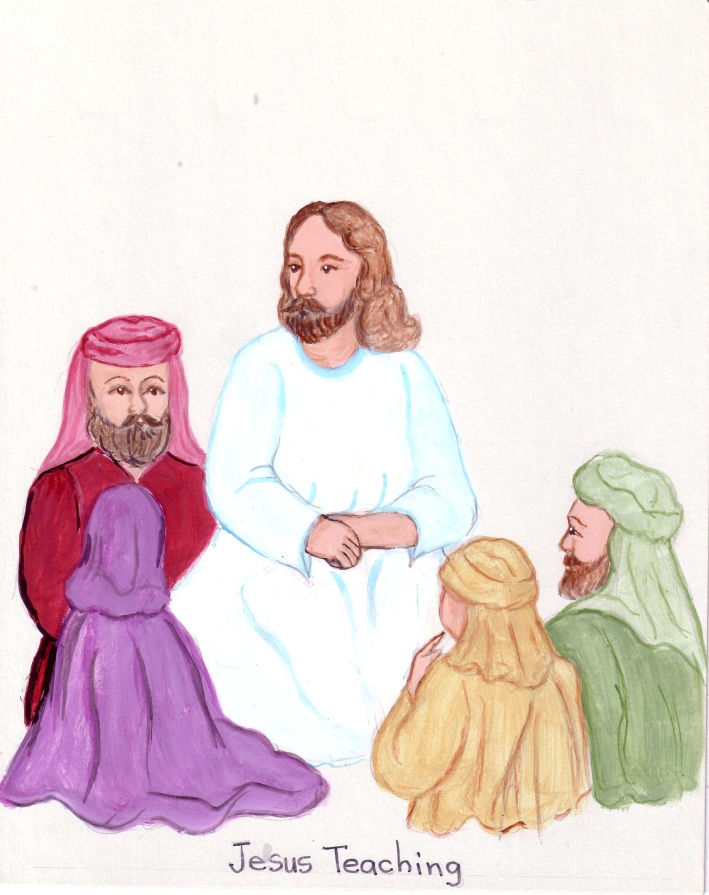
Many people followed Him because they wanted the Lord to heal their bodies. Some followed the Christ simply because of the crowd of people. Still other people, like the Pharisees, followed Him because they were jealous of the love which the crowds of people gave to Jesus, and they wanted to find something in what Jesus said or did that was against the law. If they once did that, they could complain about Him to the rulers and in that way put a stop to His teaching.
One day an insane man was brought to Jesus. Anyone with a kind heart would have pitied or felt sorry for this man very much, because, besides being insane, he could not see or talk. But there was only one person who could help him. The man’s friends knew that, too, and so they brought him to the Christ. When the man left the Savior, he could see and he could talk and he was no longer insane. The Christ had healed him.
The Pharisees could not do anything to make the people believe that the insane man had not been cured. So they tried to attack Jesus by saying, “To be sure this man can do great things, but he does not get his power from God; he gets it from Satan.”
They wanted Jesus to show them a sign from heaven if it was not so, but this Jesus would not do. He said that they had seen signs enough to make them believe Him, if signs were to be of any use. He also said that many other people had believed and been forgiven after less teaching than they had had.
As Jesus spoke these things a woman in the crowd called out to Him, “Your mother is a happy woman to have such a son as you.”
Jesus said to her, “Happier still are those who hear the word of God, and obey it.”
After this talk the people thought more of Jesus than ever, and followed Him in great crowds. There was not a day of rest for Jesus, and He could hardly find time to eat His food.